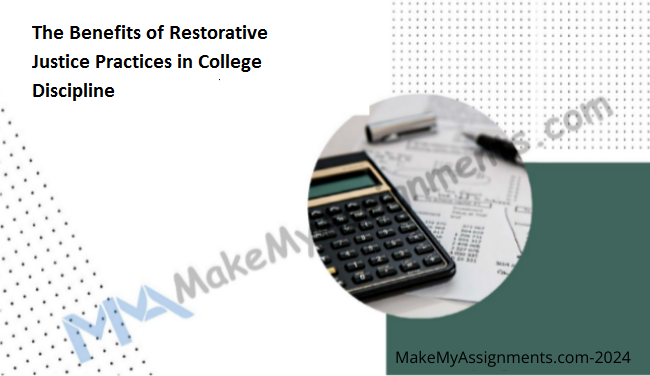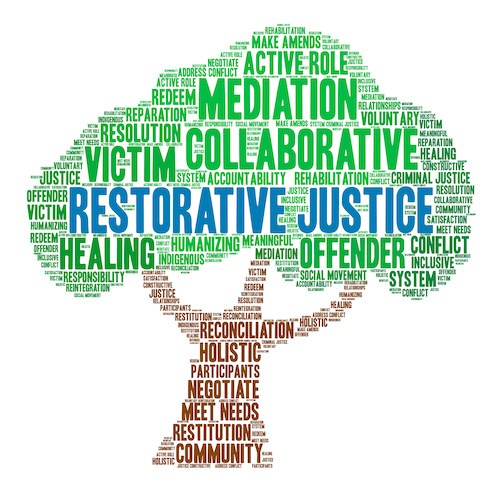
The Benefits of Restorative Justice Practices in College Discipline
In recent years, the landscape of college discipline has undergone a significant transformation. Traditional punitive measures are gradually being replaced by restorative justice practices, heralding a new era of fairness, accountability, and healing within academic institutions. Restorative justice, with its emphasis on repairing harm and rebuilding relationships, offers a refreshing alternative to punitive approaches. Let’s delve into the benefits of embracing restorative justice practices in college discipline.

Fostering a Sense of Community
Restorative justice prioritizes community involvement and dialogue. By bringing together all stakeholders—students, faculty, administrators, and sometimes even affected community members—restorative processes create a space for open communication and understanding. Through facilitated discussions and circles, participants have the opportunity to express their perspectives, share their experiences, and collectively address underlying issues. This fosters a sense of belonging and collective responsibility within the college community.
Empowering Individuals
Traditional disciplinary measures often focus solely on punishment, neglecting the opportunity for personal growth and accountability. In contrast, restorative justice empowers individuals to take ownership of their actions and actively participate in the resolution process. By encouraging offenders to acknowledge the harm they have caused and take steps to make amends, restorative practices promote accountability and personal development. This empowerment not only benefits the individual but also contributes to a positive campus culture built on mutual respect and understanding.
Healing and Restoration
Central to restorative justice is the concept of healing and restoration. Rather than perpetuating cycles of harm and retaliation, restorative processes seek to repair the damage caused by misconduct and restore relationships within the college community. Through meaningful dialogue, mediation, and restitution, restorative justice enables both victims and offenders to find closure and move forward constructively. This focus on healing not only addresses the immediate impact of wrongdoing but also helps prevent future incidents by addressing underlying conflicts and grievances.
Promoting Fairness and Equity
One of the key principles of restorative justice is fairness. Traditional disciplinary systems often disproportionately affect marginalized and minority students, exacerbating existing inequities within higher education. Restorative practices, however, strive to create a more equitable and inclusive environment by prioritizing the needs and voices of all individuals involved. By promoting dialogue and understanding, restorative justice helps ensure that disciplinary outcomes are fair, transparent, and tailored to the specific circumstances of each case.
Strengthening Campus Safety
Contrary to popular belief, restorative justice does not undermine campus safety; rather, it strengthens it. By addressing the root causes of misconduct and promoting accountability, restorative practices contribute to a safer and more secure learning environment. When students feel valued and supported, they are more likely to adhere to community standards and resolve conflicts peacefully. Additionally, restorative justice fosters a sense of trust and cooperation between students and administrators, enabling proactive interventions and early intervention strategies to prevent future incidents.
At MakeMyAssignments, we believe in supporting students not only academically but also in their personal and professional development. One of the ways we achieve this is by integrating restorative justice principles into our approach to handling disciplinary matters. Here’s how MakeMyAssignments can assist students in navigating college discipline using restorative practices:
Guidance and Support
When students find themselves involved in disciplinary proceedings, it can be a daunting and stressful experience. At MakeMyAssignments, we offer personalized guidance and support every step of the way. Our team of experienced mentors and advisors understands the importance of restorative justice and its potential to transform disciplinary outcomes. We provide students with the resources, information, and emotional support they need to navigate the restorative justice process with confidence and resilience.
Restorative Justice Education
Many students may be unfamiliar with restorative justice principles and practices. MakeMyAssignments offers educational resources and workshops to help students understand the philosophy behind restorative justice and its benefits. Through informative sessions and interactive discussions, students learn about the importance of accountability, empathy, and healing in resolving conflicts and repairing harm. By equipping students with this knowledge, we empower them to actively participate in restorative processes and contribute to a positive campus culture.
Facilitation and Mediation
Restorative justice relies on facilitated dialogue and mediation to address harm and restore relationships. MakeMyAssignments provides skilled facilitators and mediators who specialize in restorative practices. Whether it’s facilitating a circle discussion between parties involved in a conflict or mediating a restorative conference, our team ensures that all participants have the opportunity to express their perspectives, listen to each other, and work towards a mutually agreeable resolution. Through respectful and inclusive facilitation, we help students navigate difficult conversations and find common ground.
Conflict Resolution Strategies
Preventing conflicts and resolving disputes effectively are essential aspects of restorative justice. MakeMyAssignments offers conflict resolution training and workshops to help students develop the skills and strategies needed to address conflicts constructively. From communication techniques to negotiation tactics, we empower students with practical tools for resolving disputes in a peaceful and respectful manner. By promoting proactive conflict resolution, we contribute to a safer and more harmonious campus environment.
Advocacy and Representation
In some cases, students may require advocacy and representation during disciplinary proceedings. MakeMyAssignments provides experienced advocates who advocate for students’ rights and interests throughout the restorative justice process. Whether it’s presenting their case, negotiating agreements, or ensuring fair treatment, our advocates work tirelessly to support students and uphold principles of fairness and equity. By providing a voice for students and advocating on their behalf, we strive to achieve just and equitable outcomes in college discipline.
In summary, MakeMyAssignments is committed to empowering students through restorative justice in college discipline. By offering guidance, education, facilitation, conflict resolution strategies, and advocacy, we support students in navigating disciplinary matters with integrity, compassion, and resilience. Together, we can create a campus culture that embraces restorative principles and fosters healing, accountability, and positive relationships





